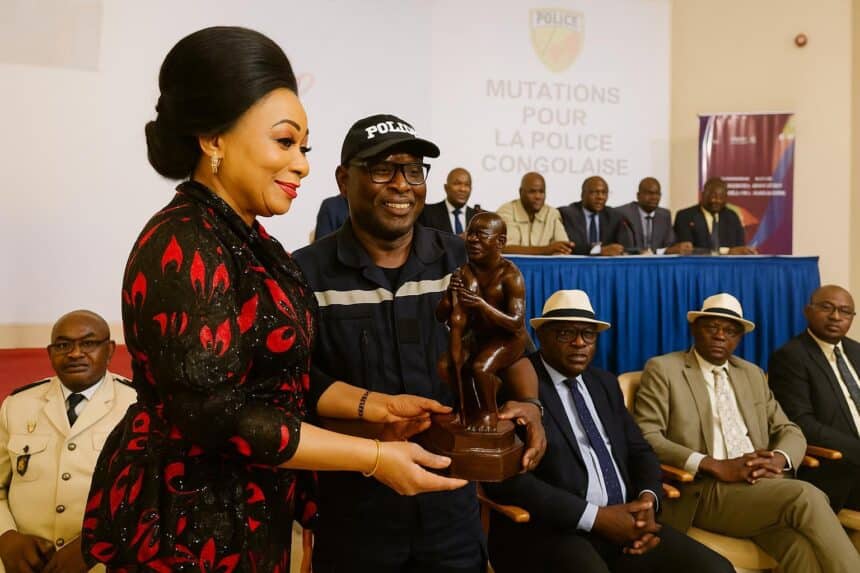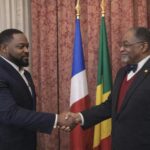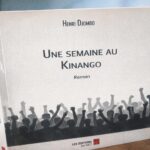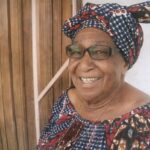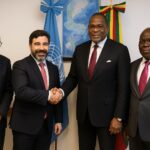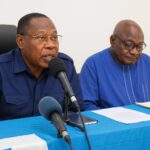Police writers honoured in Brazzaville
Blue caps, black notebooks: at the Pierre Savorgnan de Brazza Memorial, eight officers of the police and gendarmerie swapped their epaulettes for laurel wreaths, receiving national literary awards that salute a surprising, vibrant and often discreet branch of Congolese culture.
The 16 September seminar-workshop, branded “Knights of the Pen in Blue Uniform”, was steered by the Strategy, Cooperation and Communication Directorate of the Interior Ministry and sought to highlight writing produced after night patrols and training drills rather than inside quiet libraries.
Interior Cabinet Director Séraphin Ondelé opened the forum with a call for “ideas that build a republic where code and freedom meet, where literature walks beside the uniform to enlighten the people”, a message warmly echoed by officers, students and publishers in attendance.
Diverse voices from the field
General Albert Ngoto, revered for decades of civil-security leadership, now revisits pivotal rescue operations in prose that mixes military precision with archival flair, offering readers a front-row seat to moments that rarely reach newspaper columns.
Colonel-Major Michel Innocent Peya, also a PhD in management sciences, channels his field notes into essays championing environmental stewardship and circular economy strategies, positioning the police station as an unexpected observatory for climate action.
Poet-soldier Colonel-Major Charles Nkouanga blends mission diaries with meditations on love and the human condition, arguing that an officer who understands emotion can negotiate conflict with the same finesse used to craft a sonnet.
Historian Roch Cyriaque Ngalebayi, for his part, interrogates collective memory through accounts of tragedy and rebirth, reminding readers that the uniform does not erase the wounds of history but can help stitch them with carefully chosen words.
Science, melody and militancy on the page
Colonel-researcher Maurice Itous-Ibara introduces an audacious “Magnon Physics” approach to global warming, translating complex thermodynamics into accessible narratives that invite high-schoolers to debate solutions alongside beat cops.
Captain Charles Peter Moukala Kinzounza, a gendarme by day and guitarist by night, sketches the hopes and hurdles of today’s youth, weaving urban slang with police jargon to create novels that feel both official report and street ballad.
Retired Colonel Athanase Moussoungou ventures into esoteric poetry, suggesting that the same codes used to secure barracks may unlock inner realms of spirituality; his verses have already inspired book-club discussions in Brazzaville high schools.
Captain-retiree Ruphin Sognele adopts a militant tone, asking readers to rethink the fragile pact between law and conscience; jurors praised his style as “an invitation to re-imagine justice without losing respect for authority.”
Jury and readers spark nationwide demand
Presiding judge Professor Robert Ludovic Miyouna applauded the laureates’ “penetrating insights” and urged libraries, bookshops and digital platforms to carry their titles so “citizens may glimpse the compassionate heart beneath the badge.”
Analysts note that the recognition aligns with government ambitions to boost national reading habits, a priority reinforced by the Brazzaville International Book Fair and the recent tax incentives for local publishers.
Libraries in Pointe-Noire report a spike in requests for titles by uniformed authors following social-media coverage of the ceremony, with librarians noting that teenage readers are “curious to see how a police siren sounds on paper”.
The Interior Ministry’s communication unit confirmed that e-book versions of the winning works will be uploaded to the national open-access portal in the coming weeks, ensuring readers in remote districts can download them without data charges.
Publishers hope the momentum will encourage other officers, firefighters and customs agents to submit manuscripts to the 2024 edition, which jurors plan to open to short-story collections and graphic novels in Lingala, Kituba and Téké.
Communication, freedom and security online
Before the award ceremony, journalists and experts debated “Institutional Communication: Between Codes and Freedoms”, stressing that fast-moving social networks require equally agile rules.
Consultant Joachim Mbanza welcomed progress: “No reporter should now be jailed for a press offence; complaints must go to the Superior Council for Freedom of Communication,” he reminded, a safeguard that still applies even if a grievance starts at a gendarmerie desk.
Journalist Carine Ibombo cautioned that the right to speak comes with duty: “Because we can publish everything doesn’t mean we should.” Digital specialist Alain Ndalla advocated home-grown mastery of artificial intelligence to preserve national sovereignty, while ministry communicator Stanislas Itoua Ikama balanced transparency and security.
Association of Congolese Women Jurists head Jocelyne Milandou lauded the exchange and urged the media watchdog to extend outreach on existing legal frameworks, a proposal greeted by the fanfare that closed the session and reminded guests that harmony is possible between brass instruments and brass badges.
Stories that strengthen the Republic
The Brazzaville gathering ultimately underscored how stories born in patrol cars can enrich classrooms, how measured communication fortifies trust, and how culture and security together nurture a resilient, optimistic Congo.

